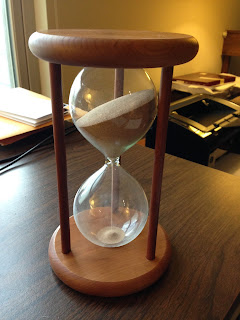An Hour a Day (August theme) by Claudia Mills
I try to write every day. I don't succeed in doing it, but that is my goal and my dream. I'm happier when I'm writing and unhappier when I'm not writing. But my secret for not burning myself out as a writer is that even though I write most days, I write for only a short time each day, indeed only for one sweet brief hour.
I stumbled upon this way of structuring my writing life when I read an article in the Readers' Digest when I was a child: "What You Can Do with an Hour a Day." It told of artists completing work for juried shows on the hour-a-day system, of self-taught men achieving levels of intellectual brilliance by reading for an hour a day at the Library of Congress, of greatness and glory accumulated sixty minutes at a time.
As an adult I read Anthony Trollope's fabulous autobiography and learned that he wrote and published his huge, sprawling Victorian novels by writing for a short, fixed stint each morning, while working full-time at a high level position for the British postal service. He penned these words which I committed to memory: "A small daily task, if it be really daily, will beat the labors of a spasmodic Hercules."
To measure my hour, I use this hourglass:
I stumbled upon this way of structuring my writing life when I read an article in the Readers' Digest when I was a child: "What You Can Do with an Hour a Day." It told of artists completing work for juried shows on the hour-a-day system, of self-taught men achieving levels of intellectual brilliance by reading for an hour a day at the Library of Congress, of greatness and glory accumulated sixty minutes at a time.
As an adult I read Anthony Trollope's fabulous autobiography and learned that he wrote and published his huge, sprawling Victorian novels by writing for a short, fixed stint each morning, while working full-time at a high level position for the British postal service. He penned these words which I committed to memory: "A small daily task, if it be really daily, will beat the labors of a spasmodic Hercules."
To measure my hour, I use this hourglass:
I love it so much! With the hourglass, I don't need to watch the clock and rue the fact that it's now 5:02 instead of 5:00, so my hour has been ruined. Instead my hour begins when I turn over the glass and begin to write.The sand trickles through the glass as words trickle through my pen.
My goal is to complete a page during my hour: just one pitiful, pathetic, puny page. Yet the simplest math will show how many pages a year one can fill with this method. How quickly they add up!
This leaves me the remaining 23 hours a day to sleep, work (I've had a full time job for most of my writing career), enjoy time with friends and family, walk, read, and Google myself to see if I've possibly won any major awards that they forgot to tell me about.
I read this line once, attributed to Goethe: "Never hurry, never rest." This is my writing mantra.

Great quote! Love the hourglass too.
ReplyDeleteLOVE that quote.
ReplyDeleteI like the line by Goethe. Sounds kind of Zen. And the hourglass is a nice touch. :-)
ReplyDeleteClaudia, I think we're really writing sisters! :) Thanks for this. I love the hourglass idea; I may try that myself instead of a timer.
ReplyDeleteI am happy to be your writing sister, Mrs. P!
DeleteI love this so much. I am such a spasmodic Hercules, and spin my wheels quite effectively. I'm going to try this approach. Thank you so much for posting it.
ReplyDeleteNow we can have a new term of self-reproach: you spasmodic Hercules, you!
DeleteLike the Tortoise...slow and steady wins the...book! Love the hourglass. I also try to write everyday for a short period. Good to know I'm not alone!
ReplyDeleteYes, Aesop said it first and best. But good to have little reminders....
DeleteI think you must get more done in an hour than I do all day. I like your system. I'm going to give it a try.
ReplyDelete